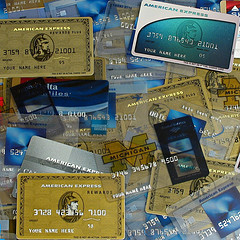American Express To Pay Out $85 Million To Customers For Variety Of Consumer Violations Image courtesy of (The.Comedian)
“[A]t every stage of the consumer experience, from marketing to enrollment to payment to debt collection, American Express violated consumer protection laws,” reads a statement from the CFPB.
A number of concerns were raised during a routine look under the hood at American Express Centurion Bank by the FDIC and the Utah Dept. of Financial Institutions. The investigation was then handed off to the CFPB, which also found violations at American Express Travel Related Services Company, Inc. and American Express Bank, FSB.
Among the no-nos found during the investigation:
* Misleading ads for the American Express “Blue Sky” credit card program: “Consumers were sometimes led to believe they would receive $300 in addition to bonus points if they signed up for this American Express Centurion Bank program. But consumers who met the qualifications did not receive the $300. This violates federal laws prohibiting deceptive practices.”
* Unlawful late fees: “American Express Centurion Bank and American Express Bank, FSB billed late fees on certain cards based on a percentage of the debt in violation of the Credit CARD Act.”
* Age discrimination: “American Express Centurion Bank used a credit scoring system that treated charge card applicants differently on the basis of age. For a period of time, the bank did not fully implement the system for applicants over the age of 35. This violated the Equal Credit Opportunity Act because it requires credit scoring systems that take age into account to be properly designed and implemented.”
* Failing to report consumer disputes to consumer reporting agencies: “American Express Centurion Bank and American Express Bank, FSB failed to report the existence of certain customer disputes to credit bureaus, which is a violation of the Fair Credit Reporting Act.”
* Misleading consumers about debt collection: “All three of the American Express subsidiaries deceived consumers into believing there were certain benefits to paying off old debt. Consumers were wrongly told that if they paid off the old debt, the payment would be reported to credit bureaus and could improve their credit scores. In fact, American Express was not reporting the payments and the debts were so old that even if they had tried to report them, many of the payments would not have appeared on these consumers’ credit reports or affected their credit scores. American Express also told some consumers that a portion of their debt would be waived or forgiven if they accepted certain settlement offers. But for customers who applied for a new American Express card, the company was not really forgiving or waiving the debt.”
To atone for their sins, American Express and its subsidiaries have crossed their hearts and made pinky swears to never, ever, ever, EVER do any of that stuff again. The company will also be paying out $85 million to approximately 250,000 consumers, specifically:
* Consumers who were misled into paying old debt because they thought it would be reported to the credit bureaus will be reimbursed the money they paid plus interest.
* Consumers who were promised their debt would be forgiven and who were denied new credit cards because the debt was not really forgiven, will receive $100 and a pre-approved offer for a new card with terms the CFPB and the FDIC find acceptable. If the consumer already paid the waived or forgiven amount in order to get a new card, they will be refunded that amount plus interest.
* Blue Sky customers who were promised $300 for signing up will get their $300.
* Consumers who paid an illegal late fee will be reimbursed, with interest.
American Express is also responsible for locating and notifying these people. Current AmEx customers will receive an account credit. People who are no longer AmEx customers will be paid by check. Payouts are expected to be disbursed by March 15, 2013.
Additionally, AmEx was hit with a civil monetary penalty of $27.5 million, with $14.1 going to the CFPB, $3.9 to the FDIC, $9 million to the Board of Governors of the Federal Reserve System and $500,000 to the Office of the Comptroller of the Currency.
Want more consumer news? Visit our parent organization, Consumer Reports, for the latest on scams, recalls, and other consumer issues.


